It is easy to get caught up in the glitz and glamor of recorded music. It is also easy to watch people fall victim to 15 minutes of fame, only to emerge on the other side as irrelevant and desperate, sitting back and claiming it could never happen to you. What is difficult is being in the middle of the music industry’s empty promises and still maintaining your sense of self; however, the most challenging is keeping that individuality intact in your music. We have seen bands throw themselves into trends only for the result to be watered-down art that is incapable of connecting with anyone who is profiting from it. Minneapolis-based Night Moves have navigated the fiery depths and blinding highs of the music industry, all while maintaining their sonic and personal universes in order.
The band, led by singer/songwriter John Pelant, has successfully carved out a singular lane for its bright, pop-leaning rock throughout three albums since 2012. Pelant, along with guitarist Chuck Murlowski, bassist Micky Alfano, and drummer Mark Hanson, seemingly operate on a level above the typical industry commotion in a zen-like state. This sentiment becomes even clearer on Double Life, Night Moves’ latest full-length release.
The new LP is a neon sign advertising infectious melodies, poetic songwriting, and synth-drenched solace. The 11-song LP is a labor of love, as Night Moves produced the colorful outing themselves, leaving nothing standing in the way of their sonic potential. You can hear the band’s songwriting growth on moments like the slow-burning haze of “State Sponsored Psychosis” and the glistening, subtly twangy “The Judge.” The band explores the limits of their sound while still embracing their natural pop tendencies, as evident in the punchy and danceable “This Time Tomorrow” or the cascading beauty of “Almost Perfect.” With a plethora of radio-ready hits mixed with nuanced experimentation and free will, Double Life is gearing up to be a landmark release for Night Moves.
Just about a week before the release of Double Life, Glide had the pleasure of catching up with John Pelant to discuss the new album, the band’s upcoming tour, and learning to love your own art. You can read our whole conversation below.
Double Life is the band’s fourth album with Domino Records. What do you credit the longevity of this relationship to?
It’s been a slow growth with this band. With each release, we got bigger and better, but we never blew up. It was steady growth. No one ever told us to leave them. We get a lot of people asking stuff like, “Why aren’t you bigger?” and for me, I don’t know if we went to a different label, if we would be a bigger band. Maybe management is the issue, maybe we’re bad at social media; it’s hard to say if we should be bigger and where or how we’re not.
In terms of the label, they’ve always been good to us. There hasn’t been a reason to leave. We’re also under contract; we’re on our options now, but it just hasn’t ever turned sour. It’s always been a good working relationship with Domino. We’ve seen some steady, incremental growth, too. We also have a publishing deal with Domino. It’s never been anything like “Oh shit, we’re indebted to them, so we can’t leave.” They haven’t ever fucked us over or anything; there hasn’t been a reason to leave.
How would you say the band’s sound has evolved over your career? What were you going for on your first album compared to the sound you crafted for Double Life?
It’s tough to say. In some ways, I don’t think it really has changed. I think my voice has changed the most; I don’t really recognize myself on that first record anymore. When our second album, Pennied Days, came out, that’s when I started singing a little bit differently. On our third record, I got a little more confident and boisterous. On Double Life, I just wanted to let it all out. I hid behind reverb and shit a lot, and tucked the vocals in mix volume-wise on the first record. The vocals just got gradually louder and clearer. As far as sonic textures, we still have the slide guitar, and that’s always been a big tenet, and pretty cinematic synths. We’ve always wanted to have this dreamy, pop element that is influenced by 60s, 70s, and 80s music.
It’s the same recipe to me; it’s just different mixing. Each record is mixed and produced by someone different. This one, we did most of the stuff ourselves and had Jarvis Taveniere come in to mix it.
You talk about becoming more confident as a singer. Did you find that confidence translating to the songwriting? Did you find yourself becoming more vulnerable throughout the band’s discography?
I think at a certain point, you go “Well, I have to write what I know. I can’t fool myself.” You have to get more vulnerable, and you can’t just keep writing the same songs. Even though I just said the formula is the same, I would venture to guess that people who listened to our first and second records would not think that Double Life sounds similar to them. Or maybe they would, but you have to change it up a bit. It’s tough to say what that is, but you bounce ideas and demos off your bandmates, and they can say whether or not it’s something I’ve already done or written. There’s a guy at the label who I send demos to, and he sort of okay’s things.
I probably wrote 21 songs for Double Life, and we had to choose ten to record. We have a bunch of stuff just sitting around, but there are times when the label will say, “No, I don’t like this.” I get a little bummed, but maybe he’s right. You just have to listen to the people you trust; it’s good to bounce things off people.
Minneapolis gets brought up a lot when Night Moves is mentioned. Do you find the band’s sonic identity aligns with the city? Who are some of your favorite artists from the city?
The big bands are The Replacements and Price. Everyone talks about them. I don’t know if we really sound like either of them, but we love them; they’re both incredible. We get asked this a lot, and I never really have an answer. There are some falsetto bits and some drum machine bits, but I’ve never been like “Oh, this sounds like Prince.” There’s an admiration there, but I don’t think it plays into any sonic qualities of any of the songs we’ve written. I wouldn’t say if there is a connection between our music and Minneapolis, but it’s not a conscious thing for us. We’re just trying to do shit we like.
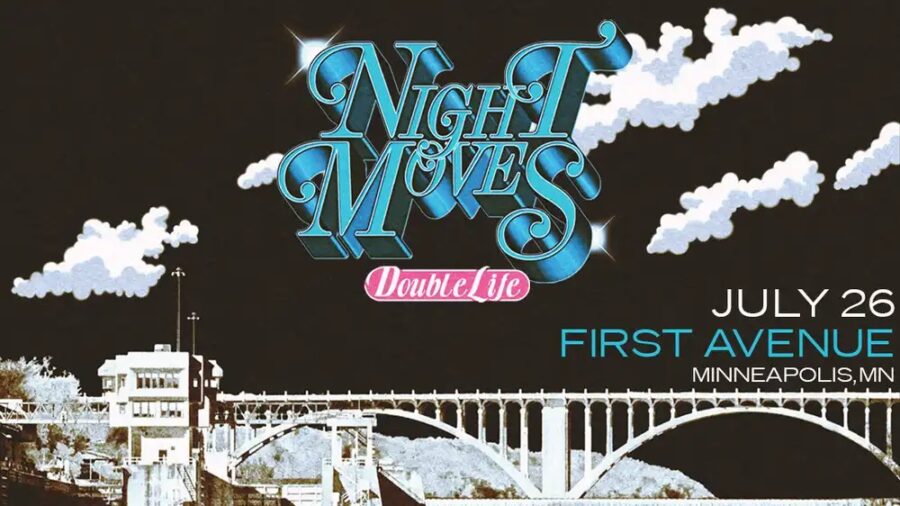
You guys seem to operate above the typical industry hullabaloo. Was this something the band had to work towards consciously, or have you always been in your own world?
I think in our own world. I mean, I know I am. I try not to pay attention to trends and stuff too much. I never really wanted to be in a scene or anything; I just want to do my own thing. I think that’s just what the band is; me doing the shit that I dig. If other people like it, that’s good, but maybe that’s why people find us hard to classify.
Double Life is incredibly sonically consistent. Is there a discussion amongst the band about which direction you’re planning on taking an album? Do the demos being chosen by the band help aid in the consistency you find?
What’s funny is that every record has been the same, but we’ve never gotten a production credit. The sound of the band is pretty unique, and we’ve always chosen those tones. We never really got credit for it, but that’s okay. With Domino, they’ve always told us to go to a professional studio and redo all these demos, and tell us that we need a producer’s name attached to it. That’s one thing that has always been a little bit weird, but we always learn from these producers, and the records always turn out. We’ve just never been pissed off about it. I don’t think we would make more money with the production credit because I know the shit we make sounds like us. No one is choosing our tones for us.
Double Life wasn’t really different. We ran into some issues trying to find a producer for this record. It got to a point where we were running out of time, so we just said, “Fuck this, let’s do it ourselves.” We were looking to mix it, which is where Taveniere came in, but when it came to recording, we just did it ourselves. Forget having a guy’s name attached to it.
When it comes to recording the songs yourselves, is there a specific environment you guys try to foster? Is there a recording studio that you guys call home?
We’ve become really fond of this place called Pachyderm Studios. It’s in Cannon Falls, it’s like forty minutes out of Minneapolis. We did the bass and drums for Double Life there, and we did our EP there. That’s been the go-to spot for us. It’s just an incredible place.
Is there ever a conversation of expanding the band? Have you ever wanted to bring in a new instrument to add to the Night Moves sound?
Yeah, we just don’t know anyone cool. We want a bongo player and a pedal steel guy, but we don’t have anyone who lives here who could do that. In Minneapolis, everyone is in so many bands. I’m just in this one, but there is a lot of crossover. What’s nice about Night Moves is that we have this core group, and this is everyone’s focus. Until we find another guy, it’s annoying to think about working somebody else in the mix. We have this tight-knit sense of humor, and we all like the same shit, which is super rare. We don’t hate each other, so bringing another guy in is going to be really tough.
Is there a particular reason there was a six-year gap between Double Life and your last record?
What’s fucked up about this is, and I don’t like that this got out there like that, but I was telling the label, we recorded something in 2021. That became an EP that got released in 2022, because it takes forever to master and put shit out with Domino, that was supposed to be the full-length of what we have put out just now. We booked a tour expecting to put out a full-length, and it got to a point where we needed something to promote this tour, so we just called it quits and told them to put it out as an EP, along with two covers. That was supposed to be a full-length, but it wasn’t. We tour extensively behind it.
Then we got home and I was like, “Okay, we have to focus and put out a full-length.” Our managers and other people were like, “When is the next record coming out?” and we had to explain that this was supposed to be a full-length, but we got fucked with communication and timelines. I don’t like it personally because it makes me look lazy.
How did you guys end up going with Double Life for the name of this record?
No, it happened at the two-minute warning. We were going to call it The Gumdrops, but the band was like, “I don’t know about that.” Our guitar player, Chuck Murlowski, brought up Double Life, and we all decided that it fit. It was nice because he’s an outsider in terms of writing the songs, so he’s able to see the whole movie and what would encapsulate all of the themes. It was the one title we could all agree on.
How do you guys decide on which songs will be singles? What is it about “Hold On Tonight” and “Ring My Bell” that made you want everyone to hear those first?
The label decided that those were the strongest ones. We all agreed, they’re the most poppy.
Is there a non-single you guys are excited for people to hear?
There is a song called “The Judge” and another called “Desperation.” Those are my other two favorites.
You guys are going on a pretty extensive tour for Double Life. What are you looking forward to most about being back on the road? Is there a song off the new album you’re most excited to perform live?
Honestly, all of the songs. We have a song called “Trying to Steal A Smile,” which is sounding really good. “Daytona” is another one I’m really excited to play. I’m just excited to play the record. I’m getting kind of sick of playing the old stuff. Playing in New York is always exciting and nerve-racking. We don’t get up to see Canada that much, even though we’re from Minnesota, so playing Toronto, Montreal, and Vancouver is exciting. Chicago will be cool.
I don’t really think about it in terms of cities too much. I just get nervous about our performance and how we’re doing. After night four, we find a groove. Whatever happens after night four, I’m excited about.
Are the live shows similar to the band’s writing process in the sense that you’ve figured out a formula? Does a live setting give you guys any flexibility?
We can do whatever we want with a live show. It’s not going to be exactly like the record, so that’s nice, but it’s also terrifying. Singing live, you have to be on your tip-toes. I feel I’ve been getting annoyed lately by playing at venues and trying to hear my voice. I’ve been thinking about getting in-ear monitors, because we’re just working off of monitors. Sometimes it gets tough because you get so used to the rehearsal space and it sounds great, then you show up to a venue and it sounds like dog shit. I’m always like, “Do we suck?” That’s just frustrating. Nothing has changed but the room, but that’s just part of the pitfalls of playing live.
Is there a venue you guys consider home base where you feel you found your groove as live performers?
Not really; every room in Minneapolis is a bit different. The through line of all that shit is learning to trust and be steadfast in your vision and not let the crowd or the sound of the venue sway you. You just have to show up, put on blinders, and do what you do. I think it takes time to believe in yourself and not give a fuck.
You’re talking about gaining confidence and trust in your music. Are there moments where that flip is switched, or did you find yourself falling into this confidence over time?
There wasn’t a single song or anything. I’ll still have days where I’m like, “I suck and should hang it up.” I’ve never really felt like I made it. I’m always trying really hard on all the records. Between the singing and the writing, it’s never been a moment of “I’m supposed to be here.” I’ve always felt like I had to earn my keep and stay.
Is there anything you hope people take away from listening to Double Life?
I just always hope the music finds people and they dig it, and it can resonate with them. That’s all I can hope for. When you write songs, it’s a very personal thing. You put melody and music to poetry, but all you can do is sing your song, put it out, get rhythm behind it, and you hope it hits someone in the right way. We put a lot of work into this, and I just hope people dig it. It’s tough to ask anything more than that.




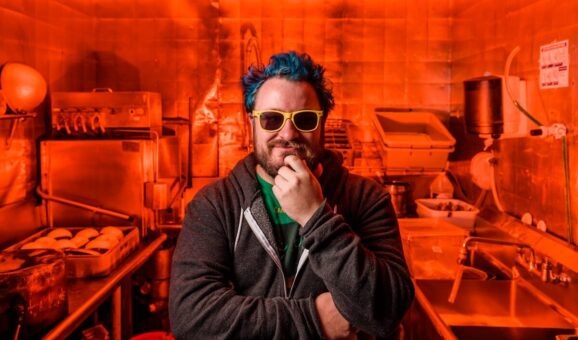
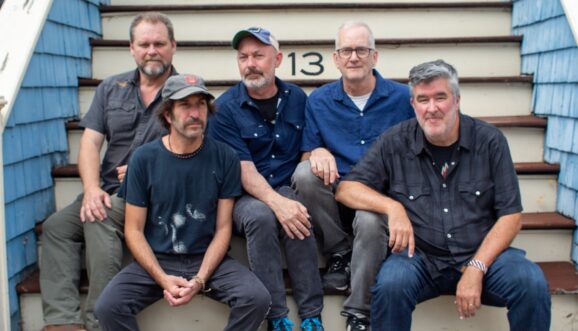


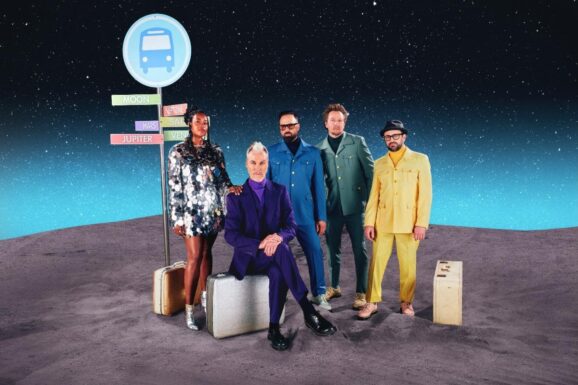
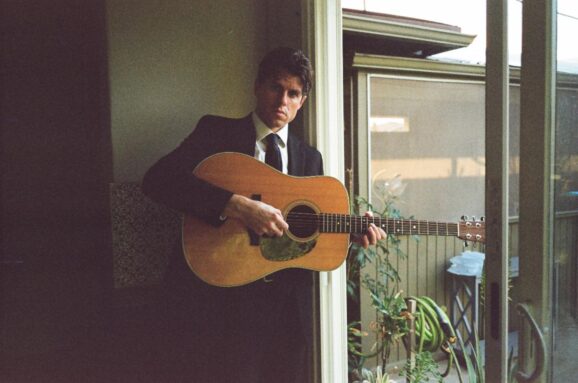
One Response
In a world obsessed with virality and fast success, it’s inspiring to see a band prioritize authenticity and trust their own instincts over hype. Can’t wait to hear the full record live.